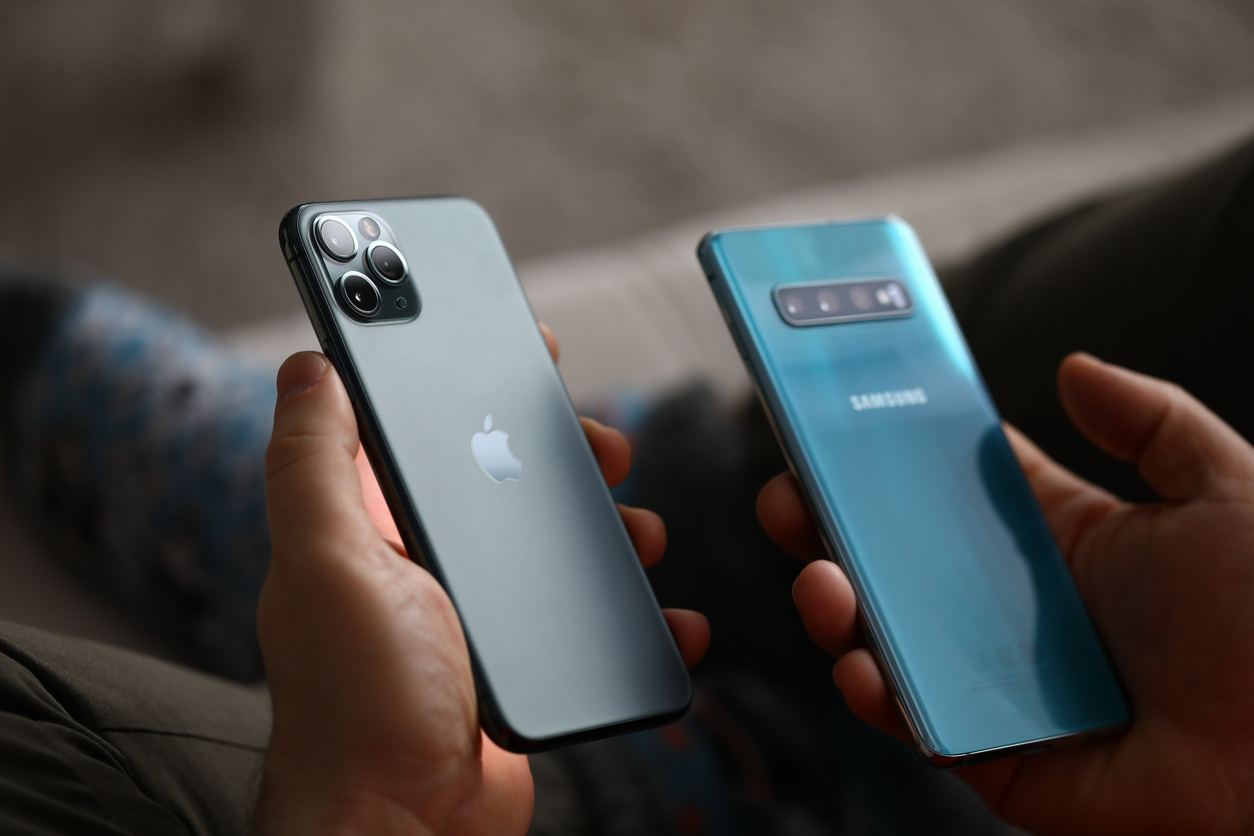Planning to buy a new smartphone? Unless you're already loyal to one brand, choosing between Apple and Samsung can be tricky to say the least.
Apple, founded in 1976 in California, revolutionized phones when Steve Jobs introduced the iPhone in 2007. They control everything — hardware, software, and services — they create a seamless experience across all Apple devices. You'll pay more, but get a smooth experience across all Apple devices.
Samsung's story is different. Starting as a Korean trading company in 1938, they've become the world's largest smartphone maker. Wondering who owns Samsung? It’s still controlled by the Lee family through various companies.
The Apple vs Samsung really depends on what you need. In this article, we’re going to draw a comparison between the two, so you can make an informed decision.
Design and Build Quality
Design is one of the most distinct features that separates iPhones and Samsung smartphones.
- You can spot an iPhone from across the room. Apple sticks to clean lines, premium materials, and minimal design. They use surgical-grade stainless steel, ceramic shields, and aerospace aluminum. Every iPhone follows the same design language — simple, refined, and instantly recognizable.
- Samsung takes risks with design. You'll find curved screens, folding displays, and phones in every size imaginable. They experiment with materials like armor aluminum and Gorilla Glass Victus. Samsung phones often include features Apple won't touch — like the S Pen stylus or under-display cameras.
For those who are curious where Samsung devices are made, they manufacture phones in Vietnam, India, China, Brazil, and Indonesia. Production is spread across these countries to meet global demand and reduce costs. However, Apple assembles most iPhones in China and India.
Build quality differs between the two. Apple uses fewer models, so they perfect each design. You get consistent quality across the iPhone lineup. Samsung makes dozens of models each year. Quality varies from budget plastics to premium metals, depending on what you spend.
Operating System
The biggest difference between Samsung vs iPhone comes down to software. Apple runs iOS, while Samsung uses Android with its One UI skin on top.
- iOS keeps things simple. You get a clean interface that works the same on every iPhone. Apps go on your home screen, settings stay consistent, and everything works. You can't change much about how iOS looks or behaves. Apple decides the experience for you.
- Samsung's One UI gives you control. You can change themes, icon packs, and layouts. Want widgets everywhere? You can do that. Prefer a minimal setup? That works too. Samsung lets you customize almost everything about your phone's appearance and functionality.
Ecosystem integration separates these systems. Your iPhone syncs perfectly with iPads, Macs, and Apple Watches. Messages, photos, and files move between devices instantly. Samsung phones work best with other Android devices and Windows computers. You need extra apps to match Apple's seamless integration.
Updates tell another story. Apple supports iPhones for 5-6 years with major iOS updates. You get new features on the same day as everyone else. Samsung promises up to 7 years of Android OS and security updates for newer flagships like the Galaxy S24, while older models get 4 OS upgrades and 5 years of security patches. However, updates may arrive months after Google’s release.
Both systems handle daily tasks well. The choice depends on whether you want simplicity or flexibility.
Performance and speed
When it comes to performance and speed…
- Apple designs its chips. The A-series processors in iPhones consistently beat Samsung's chips in benchmark tests. You'll notice this speed when editing videos, playing games, or switching between apps.
- Samsung uses two different processors. US models get Qualcomm Snapdragon chips, while other regions get Samsung's Exynos processors. Performance varies between these options, with Snapdragon usually performing better.
Both flagship phones handle everything you throw at them. You can multitask, game, and work without slowdowns. The difference shows up in demanding tasks like 4K video editing or console-quality gaming.
However, gaming performance favors iPhone slightly. Developers optimize games for iOS first, and Apple's chips deliver consistent frame rates. Samsung phones run games well but may throttle performance during long sessions to manage heat.
Both phones stay fast for years. You won't need to upgrade for performance reasons alone.
Camera capabilities
Which is better, iPhone or Samsung for photography? Both take excellent photos, but they approach imaging differently.
- Apple prioritizes natural colors and consistency. Your photos look realistic with accurate skin tones and true-to-life landscapes. The iPhone processes images minimally, keeping details sharp without overdoing it. You get, consistent colors across all lenses, better low-light performance as well as simpler camera interface.
- Samsung embraces computational photography. Their cameras produce vibrant, eye-catching images with enhanced colors. You'll find more camera options with Samsung. For example, 100x Space Zoom on Ultra models and AI scene optimization. Fun modes like Single Take are also something unique to Samsung.
Although, keep in mind Samsung gives you more megapixels and camera sensors. The Galaxy S24 Ultra packs four rear cameras including a 200MP main sensor. iPhone 15 Pro Max uses a 48MP main camera but produces equally sharp images.
Here, your preference matters the most. Choose the iPhone for point-and-shoot simplicity and natural results, or Samsung for creative control and zoom flexibility.
Battery life and charging
Battery performance varies across models, but both brands deliver all-day power on their flagship phones.
- iPhone battery life. iPhone delivers 15-20 hours of video playback despite using smaller batteries (3,200-4,400 mAh). Apple's efficient chips stretch battery life further than the numbers suggest. However, charging speeds lag behind at just 20-27W, though MagSafe wireless charging offers a convenient 15W option.
- Samsung battery life. Samsung takes a different approach with larger batteries (4,000-5,000 mAh) that provide 16-22 hours of video playback. They've also embraced faster charging speeds up to 45W, getting you back to full power quickly. While wireless charging matches iPhone at 15W, Samsung adds reverse wireless charging — handy for topping up earbuds or smartwatches.
Charging options matter. Samsung supports various charging standards and includes adapters. Apple uses proprietary Lightning (older models) or USB-C (newer models), but makes you buy chargers separately.
Both offer wireless charging, too. Samsung adds reverse wireless charging - you can charge earbuds or another phone using your device. iPhone limits wireless charging to MagSafe accessories.
Your usage determines the winner. Choose Samsung for faster charging and bigger batteries, or iPhone for better power efficiency.
Ecosystem and integration
Both brands show differences when it comes to ecosystem and integration:
- Apple's ecosystem works seamlessly. Your iPhone, iPad, Mac, and Apple Watch share everything instantly. Start an email on iPhone, finish on Mac. Your AirPods switch between devices automatically. This integration only works with Apple products.
- Samsung offers flexibility. The company that makes Samsung phones also makes tablets, watches, earbuds, and laptops—but they play well with others. Your Galaxy phone connects to Windows PCs, Google services, and mixed-brand devices. You're not locked into one ecosystem.
The choice is simple — Apple for seamless integration within their products, Samsung for compatibility with everything else.
Price and value
Now, let’s take a look at pricing and value:
- Apple keeps pricing simple. New iPhones start around $800 and climb to $1,600 for Pro Max models. Prices stay consistent throughout the year - you rarely find official discounts. Older models drop $100-200 when new ones launch.
- Samsung plays the pricing game differently. They offer phones from $200 to $1,500, covering every budget. Their flagship prices match Apple's at launch, but drop quickly. With Samsung, you may get a 0-20% discount on 2-3 months trade-in deals worth $800+.
Which is better, iPhone or Samsung, for value? This depends on timing. Samsung flagships become bargains months after release, while iPhones hold value longer but cost more upfront.
You'll pay premium prices for either brand's latest flagship. Samsung gives you more options to save money through sales, trade-ins, and choosing mid-range models. Apple makes you pay full price, but your phone retains value better for future upgrades.
Security and privacy
As you might know, Apple built its reputation on privacy. They encrypt your data end-to-end, limit app tracking, and process most information on your device, not their servers. You get minimal data collection, app tracking transparency controls, and private relay for Safari browsing.
On the other hand, Samsung provides robust security through Knox, their defense-grade platform. You can customize security settings, use Secure Folder for sensitive files, and control app permissions granularly. However, Android's open nature means more potential vulnerabilities.
Although, no matter which model or device you use, remember that public Wi-Fi networks can put your privacy at risk. Public hotspots often have weaker security, allowing hackers to intercept data through "man-in-the-middle" attacks, steal sensitive information, or even compromise devices.
If you travel frequently or spend significant time in places that only offer unsecured Wi-Fi, consider using an eSIM service instead. An eSIM service lets you activate a secure mobile data connection directly from your device without needing physical SIM cards. It provides a more private and safe alternative to public Wi-Fi, significantly lowering your exposure to security threats.
Innovation track record
Apple innovates through refinement. They perfected existing technology—Touch ID, Face ID, and the iPhone itself revolutionized phones by making them intuitive. Apple waits until features work flawlessly before releasing them.
Samsung is the first company to push boundaries. Before Apple, it introduced wireless charging, water resistance, edge displays, and foldable phones. Some experiments fail, but Samsung drives the industry forward.
Samsung takes risks. Apple polishes. You decide whether you want cutting-edge features now or refined technology later.
Final thoughts: which one wins?
Is iPhone better than Samsung? The truth is, neither wins outright — the best choice depends entirely on your needs.
- Choose iPhone if you want simplicity without the hassle of setup. It's perfect if you already own other Apple devices, as everything works together seamlessly. iPhone also makes sense if you value privacy above features, prefer consistent experiences across all your apps, and typically keep your phones for four or more years.
- Samsung is your answer if you love customizing everything about your phone experience. It's ideal for those who want cutting-edge features first, use Windows computers or a mix of different devices, and need specific tools like the S Pen or DeX desktop mode. If you enjoy experimenting with new technology, Samsung gives you that freedom.
Both companies make excellent phones that will serve you well. iPhone excels at effortless and reliable operation, while Samsung offers more features and flexibility for those who want options. The winner? Whichever one matches what matters most to you.
FAQ
What makes people choose iPhone over Samsung?
Most people choose iPhones over Samsung because of iOS. Android's software is less polished and intuitive than Apple's, and Samsung phones are less optimized than iPhones. Apple creates hardware and software, so every detail matters. This optimization makes apps run smoother, batteries survive longer despite reduced capacity, and phones stay speedy for years. Samsung manufactures great hardware, but Android isn't made for them.
What features does Samsung have that iPhone doesn’t?
Samsung offers full customization, expandable storage, and faster 45W charging. You get split-screen multitasking, multiple user profiles, and third-party app stores. Samsung provides more affordable options and innovative hardware like foldable screens and S Pen support, which the iPhone doesn't match.
Do iPhones last longer than Samsung phones?
iPhones get 5-6 years of major iOS upgrades and 7-8 years of security patches. The Galaxy S24 and other recent Samsung flagships get 7 years of OS and security updates, whereas previous models get 4 and 5 years, respectively. iPhones maintain better performance and resale value, while Samsung's update strategy is comparable to that of newer models.
Which company sells more smartphones: Apple or Samsung?
Since 2023, Apple has topped worldwide smartphone shipments. Samsung shipped 223.5 million units in 2024, while Apple shipped 232.5 million. It continued in 2023 with Apple with 234.3 million and Samsung at 226.7 million.












